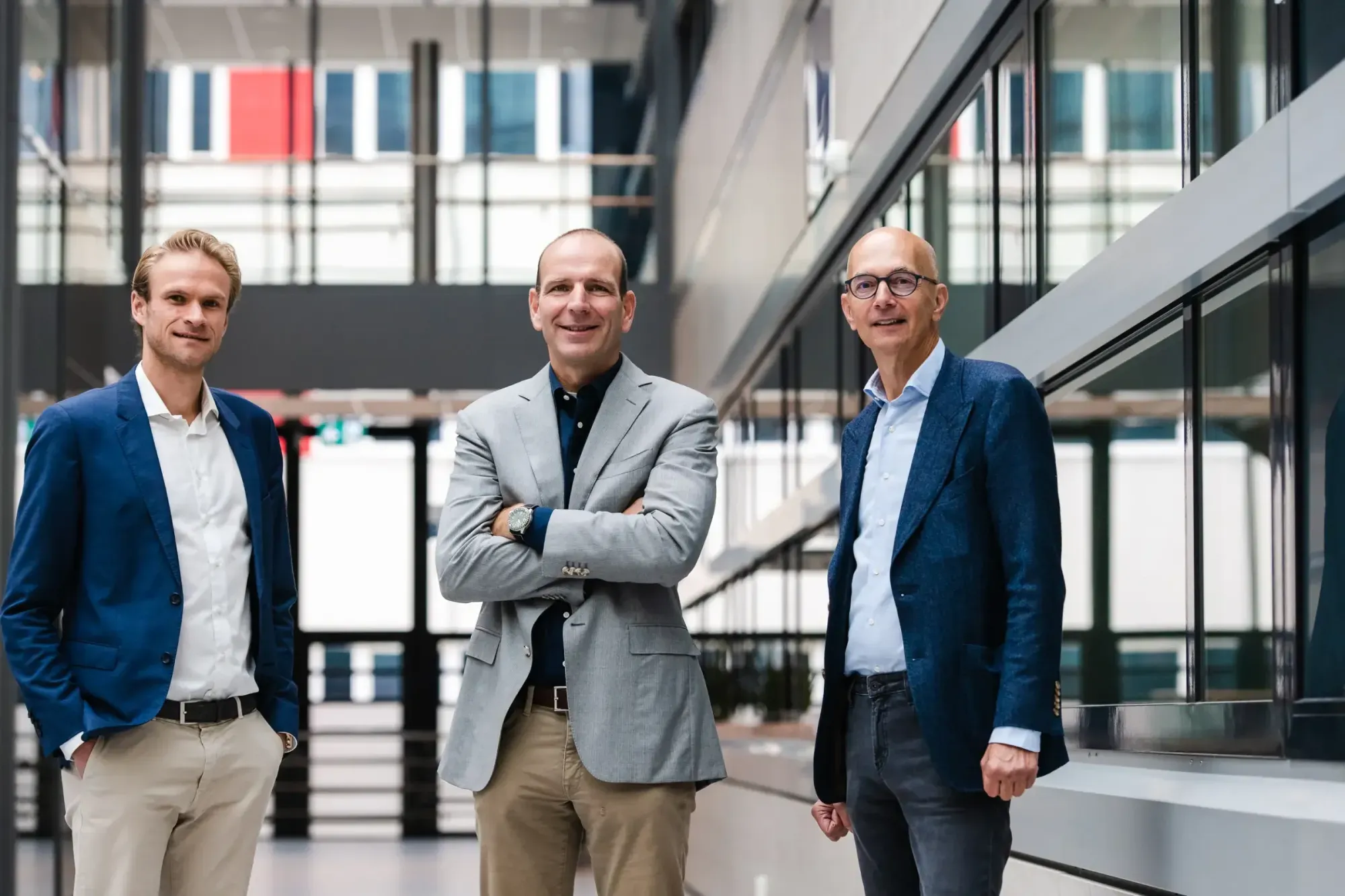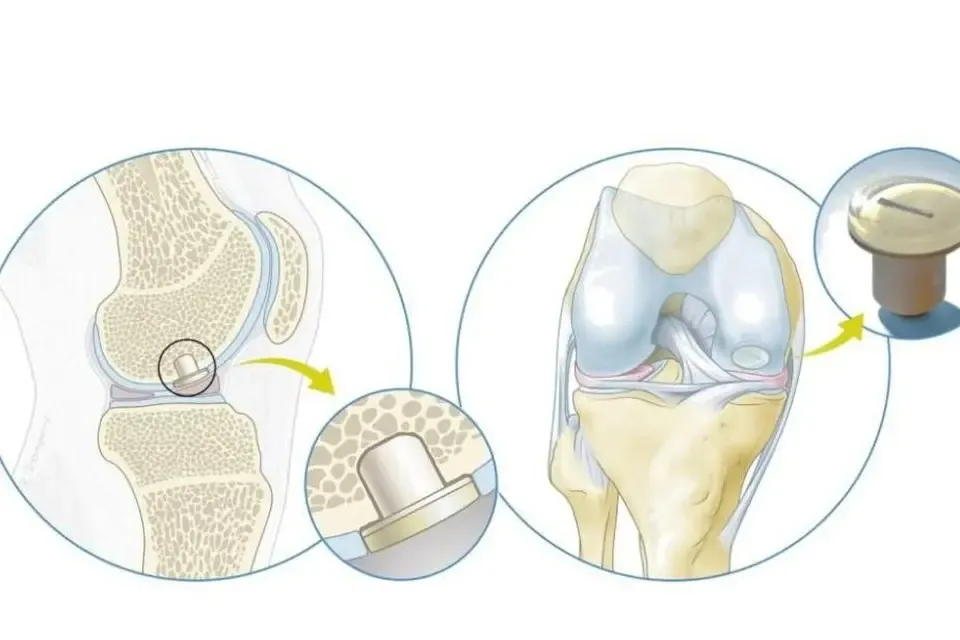An effective treatment of local cartilage defects in the knee for middle-aged patients is getting closer. Avalanche Medical, based at Brightlands Maastricht Health Campus, is on the eve of a crucial step with its self-developed SyCap, a plastic mini-prosthesis for the treatment of a cartilage defect in the knee.
CEO Bindert Vriesema is confident, he said at the Brightlands TEFAF Symposium. But he simultaneously tempers short-term expectations. 'We are taking a careful approach and think we can start small-scale clinical trials in two to three years. Before we can treat large groups of patients, we will be about five or six years away, because we first have to go through extensive clinical trials for market approval.'

Market admission takes time
'Yes, market approval seems simple,' says Bindert Vriesema, 'but this is what we have been working toward with our team since its inception in 2021. We are now finalizing the final composition of the material, the production process and the design. We are translating the production process to batches that comply with the strict laws and regulations, optimizing the design even further with advanced computer models, developing a surgical toolset and extensively testing the lifespan in mechanical test rigs. Because of the strict laws and regulations applicable to medical devices, we will also conduct a final animal test before we can start clinical trials.'

Starting in 2015
As early as 2015, the SyCap project will start, a collaboration between Maastricht UMC+, Eindhoven University of Technology, DSM and the Chemelot InSciTe research institute. 'We were looking for a solution specifically for middle-aged patients since current treatments for this group are precisely not providing the desired longevity. We increasingly see that patients are ready for a knee replacement too early, and we want to do something about that,' explains Dr. Pieter Emans, co-founder and Chief Medical Officer of Avalanche Medical and also an orthopedic surgeon at MUMC+. 'By repairing damaged cartilage at an early stage with a mini-prosthesis, we prevent further wear and tear of the joint. Think of filling a hole in the road with new asphalt before the hole just gets bigger and bigger.'
Dr. Pieter Emans
Dr. Pieter Emans, Chief Medical Officer Avalanche Medical: 'By repairing damaged cartilage at an early stage with a mini-prosthesis, we prevent further wear and tear on the joint. Think of filling a hole in the road with new asphalt before the hole just gets bigger and bigger.'
Official startup
Based on the promising preclinical studies and widespread belief in the product from various hospitals, Avalanche Medical was founded as a startup company in 2021 and the team has established itself at Brightlands Maastricht Health Campus. Anno 2024, the goal of treating the first patients is getting closer and closer.
'Middle-aged patients with cartilage defects in the knee are at high risk of developing osteoarthritis,' says Alex Roth, also involved with Avalanche from the start as Scientific Officer. 'Around 750,000 Dutch people suffer from knee osteoarthritis and these figures are rising rapidly. Currently, more than 25,000 knee replacements are placed each year, and the RIVM expects those figures to double by 2030. A knee replacement is certainly not a new knee, so expectation management is hugely important. Typically, a knee replacement also only lasts 10 to 15 years and then a new surgery is needed. This is why doctors try to replace a knee as late as possible. Replacing a knee replacement is very invasive and is often accompanied by complications. The costs then add up considerably. Again, prevention is much better than cure and that is what we focus on.'
Alex Roth
Alex Roth, Scientific Officer Avalanche Medical: 'Around 750,000 Dutch people suffer from knee osteoarthritis and these figures are rising rapidly. Currently, more than 25,000 knee replacements are placed each year and the RIVM expects those numbers to double by 2030.'
Sustainable solution
'The SyCap implant is superior to existing metal mini-prostheses,' Bindert Vriesema knows. 'Our mini-prosthesis consists of polycarbonate-urethane, an advanced plastic developed by DSM. This type of plastic is almost as elastic as natural cartilage and therefore much kinder to the adjacent healthy tissues within the knee. In this way, we believe we can prevent further wear and tear and provide longer life. Moreover, an MRI scan of the knee can always be made.' Bindert Vriesema sees many other advantages. 'The SyCap can also be used in other body parts such as shoulder, ankle and hand joints; basically anywhere where cartilage gets damaged. Of course, the design of the implant must be looked at separately for each body part, but the concept remains the same.'
Bindert Vriesema
Bindert Vriesema, CEO Avalanche Medical: 'The SyCap can also be used in other body parts such as shoulder, ankle and hand joints; basically anywhere where cartilage gets damaged. Of course, the design of the implant must be looked at separately for each body part, but the concept remains the same.'
At home at Brightlands
The team at Avalanche Medical feels at home on Brightlands Maastricht Health Campus. 'Here is everything a startup needs,' continues Bindert Vriesema who previously worked for 35 years for DSM and Pfizer. 'First of all because there is the direct link to the Maastricht UMC+; the proximity to patient and end user enables us to design a product that meets all the needs of both patient and orthopedic surgeon. Then the Campus provides us with a building, facilities, knowledge and advice. On grants, financing, marketing, financial and legal matters, IP, and so on. Exactly what a big company has, but what a startup can only dream of. Buying and hiring everything yourself is unfeasible. Furthermore, we cherish the network and presence of other startups. We help each other with tips, see each other in the kitchen. Very valuable. A startup doesn't thrive in an anonymous building somewhere, it's all about synergy. A campus is actually a big company, but for different companies and very flexible."
Commercial market
The road to the commercial market is still long, even the CEO knows. 'Technically, I think the SyCap can be used by surgeons in a few years. But first only within clinical studies and then depending on the clinical results, only market approval will follow. Until then, of course, we have no sales and a lot of costs. In the first years we managed with various grants and loans, now we are looking for seed capital from investors and business angels. With that too, we are getting a lot of help from the Brightlands network. We are being introduced to investors, getting inputs. We are confident, our invention is going to help a lot of people.'